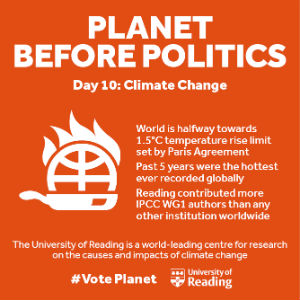#VotePlanet: Climate change summit features Reading expertise
02 December 2019

Scientists from the University of Reading’s Walker Institute are attending the latest UN conference on climate change, which seeks to encourage countries to commit to cutting emissions.
The UN’s 25th annual Conference of the Parties (COP) takes place from 2-13 December in Madrid. Representatives from the Walker Institute, which supports communities around the world in becoming more resilient to the effects of climate change, are running a series of activities there.
Climate change is one of the most pressing concerns of our time, and a key issue ahead of December’s General Election. Reading is at the forefront of scientific efforts to understand the threats to the environment and society posed by a changing climate.
As well as policy influence, research carried out at Reading has also had a significant impact on the general public. A climate stripes data visualisation created by Reading climate scientist Professor Ed Hawkins has become widely recognised as a powerful illustration of global warming.
Professor Hawkins said: “The power of the stripes graphic is not only that it shows the undeniable effect of global warming over time, but that it represents, in a single image, the entirety of more than a century of carefully assembled scientific evidence.
“What the story will be in the future is up to us. Young people today have taken the initiative by protesting and demanding action. Our fate is in our own hands.”
Seven Reading experts are authors in the IPCC’s fifth assessment report – the most contributed by any UK university worldwide.
Reading experts regularly warn that action is needed quickly to curb rising temperatures and reduce the impacts of climate change on the whole planet.
Students and academics from the Walker Institute are contributing to COP25, organising another COP Climate Action Studio, which is enabling 24 doctoral students to remotely participate in real time. They are hosting an exhibition showcasing the Institute’s work around climate change.
They will also hold a side event on 3 December in partnership with the Met Office and the University of Exeter, presenting the latest research findings on the impacts of a 1.5°C, 2.5°C or 4°C global temperature rise in different regions of the world. The event will be streamed live here.
Different approaches to reporting the latest climate science have also been put forward by Reading scientists. Professor Rowan Sutton, who has contributed to previous IPCC assessment reports, argued information on less likely climate events that could have a big impact should be prioritised in reports to aid decision-makers, in a paper published earlier this year.
Professor Hawkins’ stripes graphic was used as a backdrop on stage by rock band Enter Shikari at Reading Festival in August 2019, before being printed on the front page of the Economist and the Guardian weeks later.
The Institute of Environmental Analytics has launched partnerships with governments around the world to implement renewable energy initiatives, using satellite technology and weather data.
#VotePlanet
The University of Reading’s #VotePlanet campaign is highlighting the biggest threats facing the UK and global environment, as well as how research and action can combat them, in the lead up to the General Election on December 12.
Public concern for the environment has increased significantly in recent years, with political parties unveiling various eco-friendly pledges in their election manifestos.
The #VotePlanet campaign therefore aims to inform voters on the science behind these issues, and what sustainability action it is taking as an institution.
Follow the campaign on Twitter, Facebook and Instagram, and on the University news page. Get involved and share your examples of sustainable action using the hashtag #VotePlanet.
